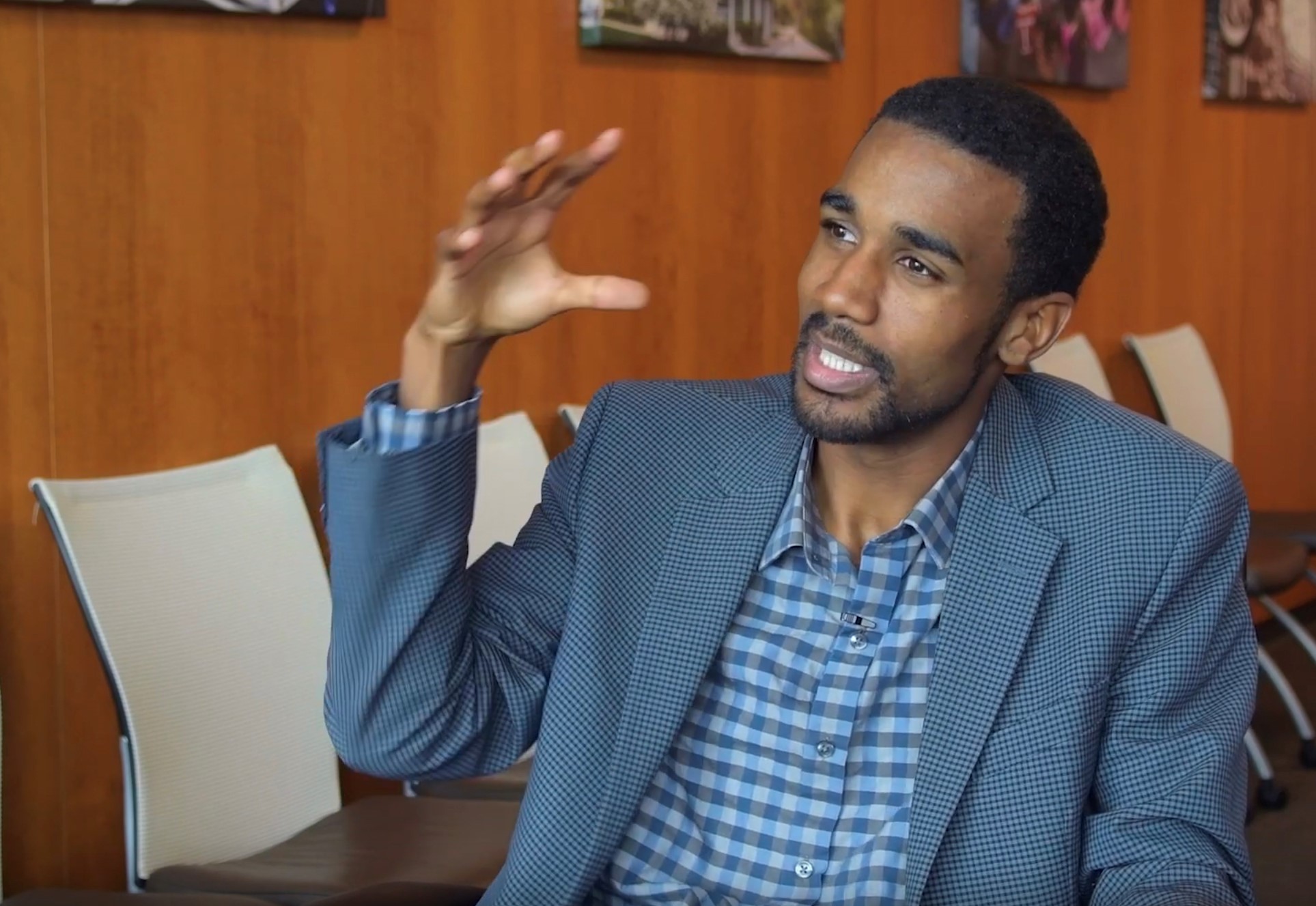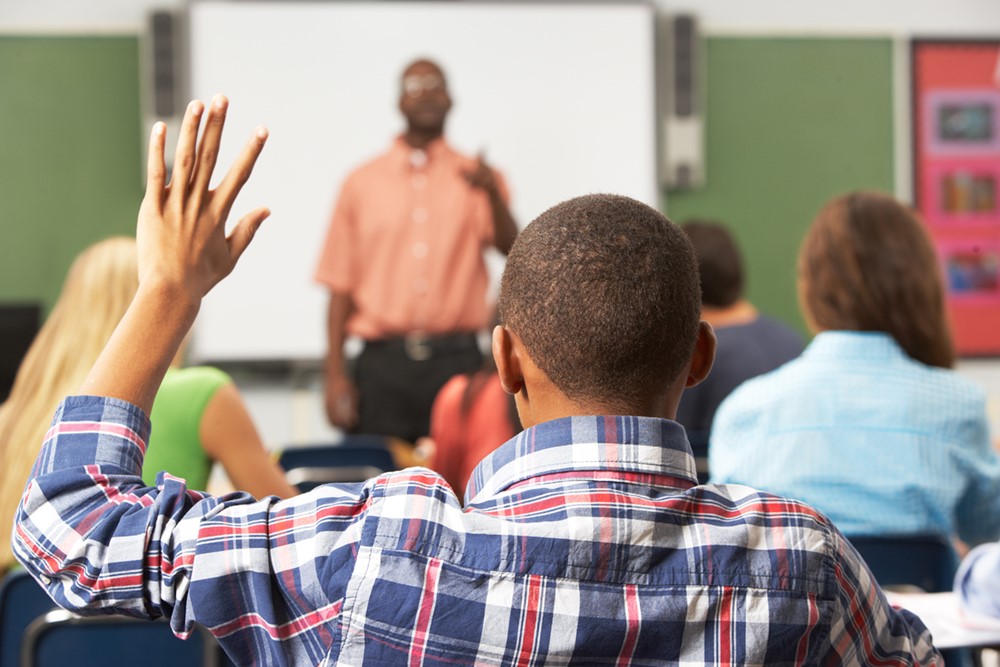Teenagers, Academic Achievements, and The Science of Hope
- Dante D. Dixson, Ph.D.
- Assistant Professor
- Department of Counseling, Educational Psychology and Special Education
- College of Education
Project Overview
- Dante Dixson focuses on the science of hope when applied to middle school and high school age youth.
- Many students have an inequitable chance at academic success due to factors beyond their control, but Dr. Dixson's research and collaborative partnerships offer evaluation and hope interventions aimed at improving student confidence, performance, and success.
Why This Work Matters
- Academic success during adolescence is linked to positive outcomes later in life. While there has been sizeable research focused on predicting academic success, Dr. Dante Dixson and his colleagues at The Hope Laboratory concentrate on perception-based constructs that facilitate academic functioning, with an emphasis on hope. The goal of this research is to leverage hope and other perception-based constructs, via one-time universal interventions that last less than 90 minutes, to give the most students the best chance at both academic and life success. This research is aimed directly at mitigating the achievement gap and creating more equity within education.
Products/Outcomes
- Hope interventions in schools that bolster hope, confidence, and achievement
- Teacher and administrator training and workshops
- Research informed engagement leading to the development of motivational videos
External Partners
- Urban and suburban school districts in Detroit and the surrounding metropolitan area
MSU Collaborators
- Joi Claiborne, MSU Doctoral Student, School Psychology
- Ersie Gentzis, MSU Doctoral Student, School Psychology
Form(s) of Engagement
- Community-Engaged Research
- Community-based, participatory research

Dante Dixson, assistant professor in the College of Education, is principal investigator of The Hope Laboratory. Dixson believes in a broad shift in thinking about student achievements. He advocates for the inclusion of hope and positivity in American education policy.
Dr. Dante Dixson conveys infectious enthusiasm when he talks about his work with teenagers, despite the fact that his research addresses some of the most challenging topics in education. Dr. Dixson specializes in understanding variables that increase students' academic achievement during adolescence and how to construct interventions that guide students toward success, especially minority or disadvantaged young people.
"I do this work because I want to make a difference," says Dixson. "The people I work with want to make a difference."
Dr. Dixson is a California native who earned an undergraduate degree in psychology, a master's degree in education, and a doctoral degree in school psychology from the University of California, Berkeley. He was hired by Wayne State University in 2016, then joined the Department of Counseling, Educational Psychology and Special Education in MSU's College of Education in 2019. "Support comes from all corners at MSU, including administrators, faculty, students, and the surrounding community. It's the total package and a team mentality," said Dixson.
A licensed psychologist, Dr. Dixson aligns engaged scholarship and community collaborations with his research expertise in the educational and psychological functioning of children and adolescents. His research interests include psychosocial precursors of achievement, at-risk youth, gifted education, the achievement gap, and the translation of research findings into school-based practices.
Influences in the Science of Hope
Why has Dr. Dixson focused on hope? It is a well-worn word used in a variety of ways, including descriptions of desire, anticipation, wishful thinking, and optimism. In a number of peer-reviewed articles, Dr. Dixson recognizes that "hope can be assessed as a state that is a temporary frame of mind," but has focused on "hope as a trait."1
Dr. Dixson maintains that hope among adolescents has two critical aspects: 1) vision—the ability to envision, with as much detail as possible, the path to the goal or outcome that they desire, and 2) belief—their perceived ability to follow through on their vision and make it a reality.
"I read an article a few years back called Social-Psychological Interventions in Education: They're Not Magic, written by Stanford University researchers David S. Yeager and Gregory M. Walton2. It was groundbreaking in my understanding of the world. The concept is simple; they argued in that paper that one's thoughts influence subsequent behaviors, and one's behavior influences subsequent achievement, and subsequent achievement reinforces one's thoughts," said Dixson.
"I am convinced that intelligence is not directly related to academic achievement. Instead, I think it is related to the odds that one engages in success-oriented behaviors, which I believe is related to academic achievement."
As Dr. Dixson explains, "For example, if one thinks they are a good student, they act like a good student, meaning that they engage in success-oriented academic behaviors and do well academically. If they don't do well, they figure out what happened, so they do better the next time. When the student achieves, likely as a direct result of their behavioral academic efforts, it reinforces the student's perception that they are a good student."
Hope Interventions with High School Students
There have been many studies that have evaluated academic achievement based on family income, family education levels, race, gender, social status, and other factors. Dr. Dixson takes that information and adds a component that identifies student attitudes. Designing a hope intervention involves listening to students.
"You can have an IQ of 200, but if you can't see how to accomplish a specific goal, or believe in your ability to do it, then it's going to be hard to accomplish," Dixson said.
"I am convinced if we can intervene when students are young, and get them to believe they can reach higher, it changes attitudes. It will help them see the path to bigger goals and motivate them to engage in the behaviors that will likely lead to them accomplishing those goals. I believe that implementing hope interventions widely will help more students experience positive outcomes despite some factors such as where they come from, or that nobody in their family has ever graduated, or they've never personally known someone who has a graduate degree," said Dixson. "If you break down the steps, show how it can be done, then it doesn't become a scary journey. The knowledge provides confidence; each achievement bolsters the confidence, leading to more behaviors and experience that lead to more achievements."
Hope interventions can be brief, sometimes 90 minutes, and the effects can last months. Dr. Dixson and his team often work with classrooms containing 20 or more students, but can also produce intervention plans for entire schools.

"We treat symptoms, not the underlying issue of why students are not trying harder in the first place," Dr. Dixson says.
The Hope Laboratory and School Partnerships
Much of Dr. Dixson's collaborative work with schools is conducted through The Hope Laboratory, offering partners a suite of deliverables that can identify and inform student well-being and attitudes.
The Hope Laboratory specializes in positive perception-based academic interventions that aim to increase the achievement of minority and disadvantaged youth.
By partnering with schools, Dr. Dixson and his team offer benefits that include student survey data, teacher and administrator training, workshops, cutting-edge research, and interventions designed to increase hope, engagement, school-belonging, and a sense of well-being among students.
Dr. Dixson works with both urban and suburban schools and with students across diverse circumstances, ranging from at-risk to the gifted and talented.
How the Coronavirus Pandemic Affects the Work
During 2020—a year that has created seismic impacts in just about every aspect of daily life for students, parents, and educators—Dr. Dixson and his team have remained focused on how to make systemic changes in their work, in order to both sustain and increase opportunities for youth to succeed.
Development is underway to produce eight 10-minute videos that can be viewed by high school students, as well as teachers, administrators, and parents. The content targets hope, motivation, and student well-being. The modules are designed to be visually entertaining, while conveying serious messages related to academic success, especially with minority and disadvantaged populations.
"The videos are creatively designed, modeled in the style of the late Sir Ken Robinson's work with cognitive whiteboard animation," said Dixson. "If we put them on a website for students to access, teachers can make assignments that can be sprinkled in coursework and homework. Initially, it's a universal intervention for a specific school. However, over time we can scale the modules while incorporating new information to better serve our partners."
In doing so, Dr. Dixson also addresses the issue of equity. "Everyone deserves a fair shot, so we are trying to make the modules as widely available as possible, to reach those that haven't yet been reached. A universal intervention first. Then we can start scaling up," he said.
Looking into the Future
Dr. Dixson believes in a broad shift in thinking about student achievements. He advocates for the inclusion of hope and positivity in American education policy.
"We treat symptoms, not the underlying issue of why students are not trying harder in the first place. I want people to understand that students' perceptions matter. And the more attention we pay to that, the better off students will be," Dixson said.
What does all this mean for today's teenagers? True to his perspective and his work, Dr. Dixson is positive, brief, and hopeful, saying "Show them how to get from here to there. Teach them that they can."
Sources
- Dixson, D. D., Worrell, F. C., & Mello, Z. (2017). Profiles of hope: How clusters of hope relate to school variables. Learning and Individual Differences, 59, 55–64. https://doi.org/10.1016/j.lindif.2017.08.011 Back to Article
- Yeager, David & Walton, Gregory. (2011). Social-Psychological Interventions in Education: They're not magic. Review of Educational Research, 81, 267-301. Retrieved from https://journals.sagepub.com/doi/10.3102/0034654311405999. Back to Article
- Written by Carla Hills, University Outreach and Engagement
- Photograph courtesy of University Communications